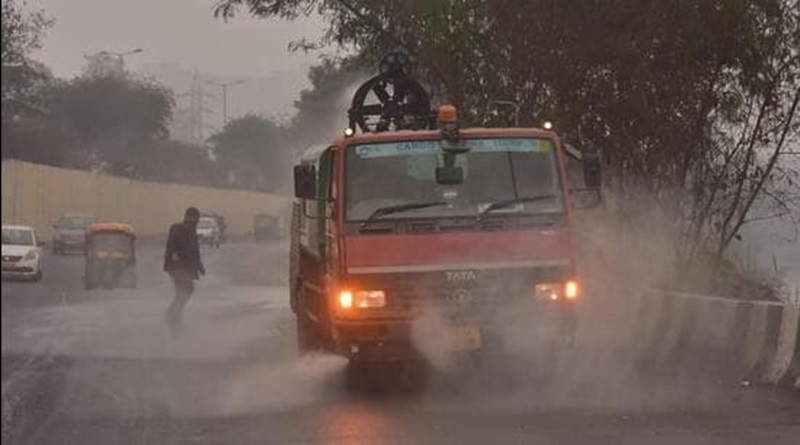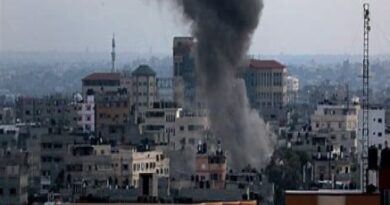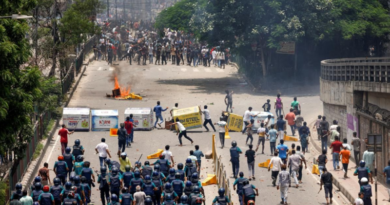Delhi’s Air Quality Index (AQI) reaches the ‘severe’ category, prompting the reintroduction of Stage 3 restrictions under the GRAP.

New Delhi: On Sunday, Delhi experienced its first “severe” air pollution day of 2024 due to a combination of factors including low wind speed, extremely cold temperatures, and the impact of biomass burning. The Air Quality Index (AQI) in Delhi reached 447 (severe) at 4pm, compared to 399 (very poor) at the same time the previous day. The last time Delhi had an AQI reading above 400 was on December 24 (411). Concerned about the sudden decline in air quality, the Commission for Air Quality Management (CAQM) called for an emergency meeting on Sunday morning and immediately implemented stage 3 measures of the Graded Response Action Plan (Grap) across Delhi-NCR.
This winter, it is the third time that stage 3 measures have been enforced, which include a ban on BS-III petrol and BS-IV diesel four-wheelers in Delhi, Gurugram, Faridabad, Ghaziabad, and Gautam Budh Nagar. Additionally, private construction activities have been effectively prohibited in Delhi-NCR. The CAQM sub-committee on Grap explained that the AQI in Delhi briefly touched 458 at 10am on Sunday but decided not to invoke stage 4 measures as it was projected to stay below 450 for a short period. The sub-committee attributed the spike in Delhi’s AQI to unfavorable weather conditions such as low wind speed, increased moisture levels, shallow mixing heights, and local sources of pollution, including extensive open burning in the past 24 hours. The sub-committee forecasted that the average AQI in Delhi would likely range between 401 and 450 for a few days, leading to the immediate implementation of the eight-point stage 3 measures in the NCR region.
The previous instances when stage 3 measures were enforced in the winter were on November 3 (AQI 402) and December 22 (AQI turned “severe”) but were later lifted on November 29 and January 1, respectively. While the curbs impose a complete ban on construction and demolition activities in NCR, exceptions are made for projects related to rail services, metro, airport, ISBT, national security or defense, projects of national importance, and healthcare facilities. Linear projects like highways, roads, flyovers, over bridges, power transmission, and pipeline laying are allowed, as well as sanitation projects. For private constructions, non-polluting and non-dust generating activities such as plumbing, interior decoration, electrical work, and carpentry are permitted. The transport department has vowed to strictly enforce these measures, deploying over 100 teams to ensure compliance, with violations punishable by a fine of ₹20,000 per offense.
Dipankar Saha, former head of CPCB’s air laboratory, explained that these conditions are common during this time of the year due to low temperatures, which create atmospheric stability and hinder the dispersion of pollutants. The calm winds, combined with biomass burning, contribute to a surge in pollution levels.
ALSO READ:
- Formal jobs surge in India even as global hiring slows: Indeed
- Nearly 80% of Indian Shoppers Discover New Products on Social Media, Meta Study Finds
- Instagram Lets You Finally Rearrange Your Profile Grid: Drag-and-Drop Launching Next Week
- Markram-Bavuma’s collective century brings South Africa one step closer to a historic win in the WTC final
- England Women’s Team 2025: Squad announced for T-20 series against India, Sophie Eckelston makes a strong comeback






Pingback: SEOAD
Pingback: โปรโมชั่น ยูฟ่าฟิวชั่น
Pingback: บริษัทรับสร้างบ้านเชียงใหม่
Pingback: University of Bilad Alrafidain
Pingback: why not check here
Pingback: True Wallet สล็อต ไม่มีขั้นต่ำ
Pingback: recruitment agency
Pingback: บาคาร่าเกาหลี
在这里下载Telegram官网最新版,适用于所有主流操作系统。本站为你提供详细的纸飞机使用指南,包括如何下载、安装以及设置中文界面,帮助你轻松使用这一全球领先的通讯 https://www.telegrambbs.com
Pingback: pg slot
https://www.telqq.com Telegram群组,Telegram群组导航。收录Telegram上的优质频道和群组,打造一个高质量Telegram导航。TGNAV收录整理了Telegram上的许多优质频道、群组、机器人,帮助用户发现更多优质的群组。
Pingback: toybf
Pingback: ตั๋วรถทัวร์
Pingback: ufa789
Dice games and online platforms like Jili777 ph both rely on strategy and luck-understanding probabilities can really improve your gameplay experience.